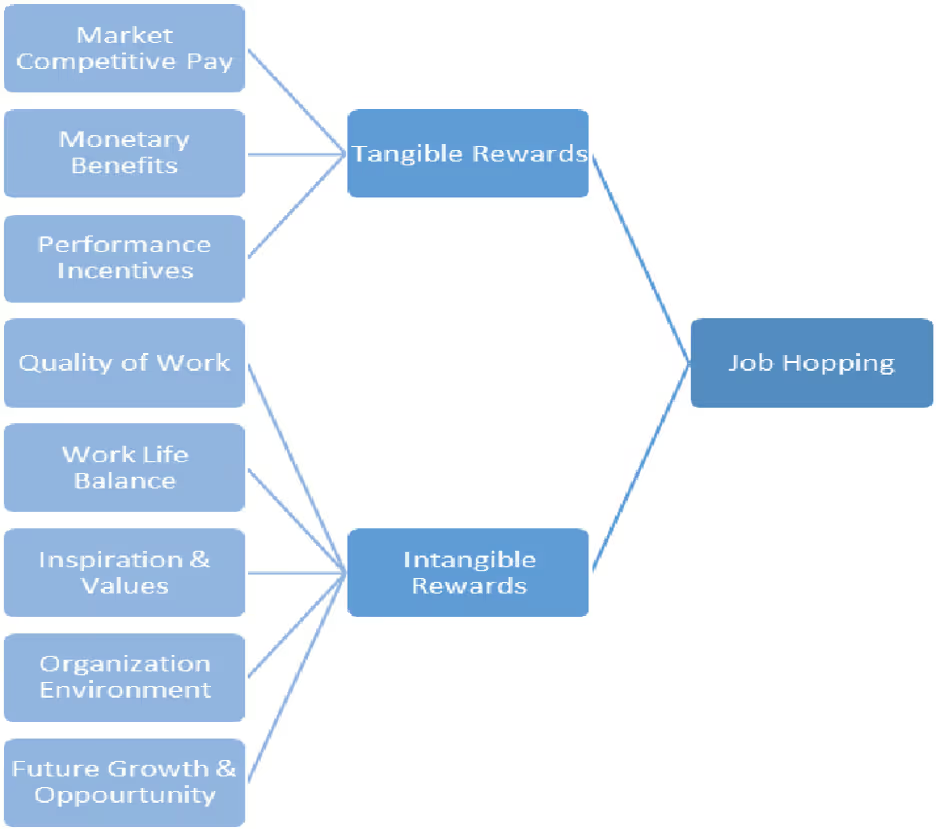Rewards in the form of gifts or vouchers given to an employee to recognize their efforts and achievements at work by an Employer are called Tangible Rewards. These rewards come in both monetary and non-monetary terms, depending on what adds the most value to the employee.
For example, a company sets a target for the employees and a particular set of rewards that they might get once they achieve that particular number. For example, some companies offer paid vacations for the employee and the family, while some choose gift cards, gadgets, and other similar compensations.

Tangible Reward vs Intangible Rewards
Tangible rewards and intangible rewards are two different types of incentives or benefits that individuals may receive in various contexts, such as work, education, or personal achievements. They have distinct characteristics and can have different effects on motivation and satisfaction. Here's a breakdown of each:
Tangible Rewards:
- Physical and Material: Tangible rewards are concrete and often physical items or monetary benefits. They can be held, seen, and touched. Examples include money, gifts, bonuses, promotions, trophies, certificates, and other physical tokens of recognition or achievement.
- Extrinsic Motivation: Tangible rewards are typically associated with extrinsic motivation, meaning individuals are motivated by external factors like money, gifts, or other tangible incentives. They often act as external stimuli to encourage certain behaviors or outcomes.
- Short-Term Impact: Tangible rewards can be effective in the short term for motivating people to perform specific tasks or achieve certain goals. However, their impact may diminish over time, and individuals may become less motivated once the reward is no longer available.
- Easy to Measure: Tangible rewards are relatively easy to quantify and measure, making them suitable for performance-based evaluations and incentive programs in many organizational settings.
Intangible Rewards:
- Non-Physical and Emotional: Intangible rewards are intangible and non-material in nature. They are often related to emotions, psychological well-being, and personal growth. Examples include praise, recognition, job satisfaction, a sense of accomplishment, autonomy, and personal development.
- Intrinsic Motivation: Intangible rewards are closely linked to intrinsic motivation, which means individuals are motivated by internal factors such as a sense of purpose, passion for the task, or personal fulfillment. These rewards focus on the inherent satisfaction derived from the activity itself.
- Long-Term Impact: Intangible rewards can have a lasting impact on motivation and engagement. They are more likely to foster sustained commitment and enthusiasm because they tap into a person's internal values and desires.
- Challenging to Measure: Intangible rewards are challenging to measure objectively, as they are highly subjective and dependent on individual perceptions and feelings. However, they are essential for fostering long-term engagement and job satisfaction.
Why Use Tangible Rewards?
Tangible rewards are used for several reasons in various contexts, including education, the workplace, and personal achievement. Here are some of the key reasons why tangible rewards are employed:
- Immediate Motivation: Tangible rewards provide immediate motivation for individuals to perform tasks or achieve goals. The promise of a tangible benefit encourages people to put in extra effort, meet targets, and focus on short-term objectives.
- Clear Incentives: Tangible rewards offer clear and concrete incentives that are easy to understand. They help individuals see a direct link between their performance or efforts and the rewards they will receive, enhancing transparency and clarity in goal-setting and performance evaluation.
Read Also: Exploring the Different Types of Incentives and How to Use Them to Motivate Your Employees
- Measurable and Customizable: Tangible rewards are measurable and can be tailored to individual preferences and performance metrics. This makes them effective tools for performance-based evaluations and incentive programs, allowing organizations to track and reward achievements more quantifiably.
Example of Tangible Rewards
To explain in detail, the different types of Tangible Rewards companies often provide to their employees; you can check out the list below based on our research.
1. Bonus: Rewards awarded in the form of cash. These can be either fixed pay that the employee is aware of or discretionary bonuses based on performance.
Read Also: Total Reward Strategy - Rewards Strategy Planning In 2023
2. Salary Increment- This, too, is based on the employee's performance which is a fixed pay and is added to the fixed salary.
3. Gifts Coupons- Gift baskets and coupons offered to employees during festivals and holidays.
4. Vacations- Employees are given paid vacations for their exceptional achievement and contribution towards the overall profit of the company.
5. Gadgets and More- Multiple companies often reward their employees with high-end gadgets once they reach a particular goal as an organization to show their appreciation.
Benefits of Offering Tangible Rewards
Tangible Rewards are essential in benefiting the employees and the organization on multiple levels. Here is what we know.
1. Employee Motivation
The first and foremost benefit of these Tangible rewards is that they lead the employees to perform better and harder at work. Rewards act as a sense of appreciation and recognition for the employees, encouraging them to reach their maximum potential.
Furthermore, it is believed that non-cash rewards are more motivating since personalized gifts and appreciation are more meaningful than cash rewards, which employees consider part of their salary.
2. Growth in Company’s Revenue
When the rewards and compensation are fixed from the company’s end, employees tend to work harder to achieve the goal and target the rewards. This, in turn, helps the companies grow their revenue overall.
3. Improves Team Collaboration
A lot of companies introduce team-based tasks and accordingly provide rewards to every team. This help creates better collaboration among team members and adds value to the company as a whole. This proves to be a great leader, a team-building exercise for all the employees, and the rewards act as a motivation to work toward a common goal.
4. Employee Retention
Lastly, if the employees are given special attention and recognition for their work, they are more likely to stay in the organization for longer. It is believed that most employees look to switch to other companies if they do not feel valued. Hence, these tangible rewards act as a great value altogether.
Conclusion
So overall, Tangible rewards can be particularly effective when they are tailored to the individual employee and their personal interests, as this can make their ward feel more meaningful and valuable. In some cases, tangible rewards can also be symbolic, such as a trophy that represents the employee's achievement.
Also Read: Elements of a Total Reward Statement
Find out how Compport can help you manage all your Rewards process, book a demo today!
%2520(6)%2520(2).avif)
Frequently Asked Question(FAQs)
1. What are some common examples of tangible rewards for employees?
Tangible rewards for employees can include bonuses, salary increments, gift coupons, paid vacations, and gadgets, among others. These rewards are often given to recognize and incentivize their efforts and achievements at work.
2. How do tangible rewards differ from intangible rewards in employee motivation?
Tangible rewards are physical or monetary incentives, while intangible rewards are non-material and focus on emotions and personal growth. Tangible rewards are often associated with extrinsic motivation, whereas intangible rewards are linked to intrinsic motivation.
3. What are the benefits of offering tangible rewards to employees?
Tangible rewards can benefit employees and organizations by motivating employees to perform better, leading to revenue growth. They can also improve team collaboration and enhance employee retention, as employees feel valued and recognized.
4. Why are tangible rewards important in the workplace?
Tangible rewards are important in the workplace because they provide immediate motivation, offer clear incentives, and can be measured and customized to align with individual preferences and performance metrics. They help organizations recognize and reward employee achievements effectively.
5. How can companies choose the right tangible rewards for their employees?
Companies can choose the right tangible rewards by considering the preferences and motivations of their employees. Tailoring rewards to individual interests can make them more meaningful and effective. Additionally, aligning rewards with specific performance goals and targets can help in the selection process.







.svg)


%20(54).png)
%20(53).png)
%20(52).png)
